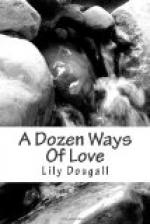I was book-binding then, out late at night, an’
I comed home to find he’d left them fur me—snowdrops
they was, an’ moss wi’ a glint o’
green light on’t, like sun shining through th’
trees; an’ there was a grey pigeon’s feather
he’d picked up somewheres, all clean and unroughed,
like a bit o’ the sky at th’ dawn; an’
there was a twig wi’ a wee pink toaedstood on’t,
all pink an’ red. The sight o’ them
fairly made me mad. ‘Twas bad enow to buy
me wi’ munny an’ the things munny can
buy, but it seemed he’d take the very thoughts
o’ God A’mighty and use them to get his
will. I were mad; but if he’d comed to
our house I couldn’t ’a spoke fur mother’s
being there; so I just took them bits o’ Spring
i’ my hand, an’ went out i’ the dark
to his house, an’ went into his room, an’
threw ’em on the floor, an’ stamped ’em
wi’ my foot, an’ I told him how he’d
sneaked round to bind me to him, an’ as how
I’d die first. I was mad, an’ talked
till I couldn’t speak fur my voice give out,
an’ that wasn’t soon. He just sat
still hearing me, but he was white, an’ shook
like a man wi’ the palsy. They said he’d
had fits once an’ that made him nervous, but
I didn’t think o’ him like that.
He was strong, fur he could make most all men do as
he wanted. He was spoiling my life wi’ his
strength, an’ I didn’t think o’
him as weakly. When I’d raged at him an’
couldn’t say more, I went out an’ was
going home i’ the dark, howding by the wall,
as weak as a baby; an’ just afore I got home,
I seed him stand just in front’ o’ me.
I thought he’d runned after me—mebbe
he did—but I’ve thought since, mebbe
not, that his body mayn’t ’a been there
at all; but anyway I seed him stand just afore me,
wi’ his eyes large and like fire, an’
him all white and trembling. He said, “I
tell ye, Jen, I will have ye mine, an’ as long
as I live no other man shall,” an’ wi’
that I went past him into the house.’
‘Go on, Jen,’ said the carter.
’All I knows is that the word he spoke was a
true word. Next day they comed and telled us
he was found all par’lysed in his chair, an’
he couldn’t move nor speak. From that time
the doctors ’ud sometimes come from a long way
off; they said as there was somethin’ strange
about his sickness. I doaent know what they said,
I niver seed him again. There’s part o’
him lies i’ the bed, an’ the parish feeds
him, an’ the doctors they talk about him.
I niver seed him again sin’ that night, but I
knows what he said was true, an’ there’s
many a man as ’as seed him anear me sin’
that day. I tell ye, Johnnie, there’s trouble
to face i’ this world worse ner death,—not
worse ner our own death, fur that’s most times
a good thing, but worse ner the death o’ them
we love most true—an’ worse ner parting
i’ this world, Johnnie, an’ worse a’most
than sin itself; but, thank God, not quite
worse ner sin. But I never knowed, lad, how bad
my own trouble was—though it’s a’most
drove me hard at times, not recking much what I said
or did—I niver knowed, my lad, how bad it
was till I knowed it was yer trouble too.’




